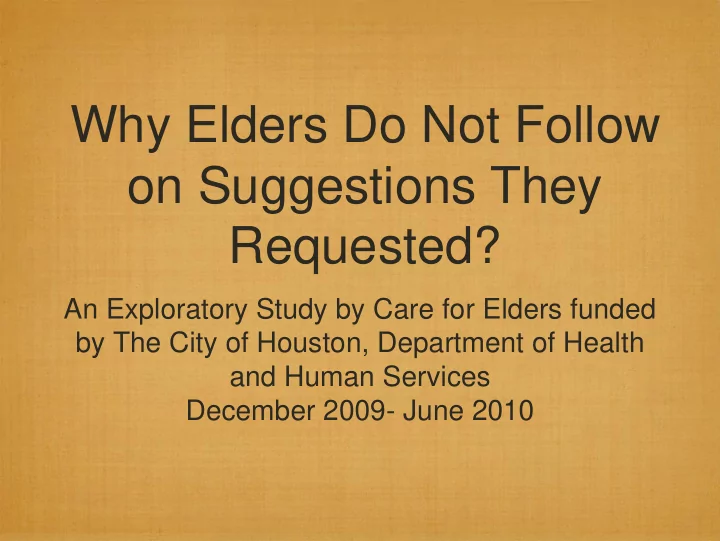

Why Elders Do Not Follow on Suggestions They Requested? An Exploratory Study by Care for Elders funded by The City of Houston, Department of Health and Human Services December 2009- June 2010
Active Participants Ilana Reisz, PhD, Health Context, PI Gerald Goodman, DrPH, Texas Woman‟s University. Co PI Esther Steinberg, LCSW, Consultant Evelyn Carlson, Director, Access & coordination, CFE Jane Bavineau, Senior VP Sheltering Arms, Executive Director, CFE Vishnu Nepal, MPH, A.J. Rosario, MD, MPH, & Deborah Banerjee, PhD, MS, City of Houston, Department of Health and Human Services
What was the study about? proportion of vulnerable elders is growing without a solid safety net 2004 study by Dr. Moseley raised alarm about elders whose needs were unmet due to their own inaction 2008 Hurricane Ike raised another concern for vulnerable elders Where there systemic barriers for most vulnerable elders to meet basic needs?
we wanted to know are there systemic barriers that stand in the way of vulnerable elders when they attempt to address urgent needs? How did vulnerable elders deal with hurricane preparation and its aftermath? What can we learn about managing services better for elders in need?
Guiding Questions What did elders say about their experiences in trying to get help to resolve basic needs? What is the understanding that professional helpers have on addressing the needs of vulnerable elders? How did elders prepare for, and live through, Hurricane Ike?
The Sample all elder callers n=482 Needs Met Elder Specialist n=262 Case Manager Needs not met n=220 Characteristics: • age span: 35% 60-64; 45% 65-74 • F/M ratio: 6/1 Inclusion criteria: • African American - 58% Elders whose needs were not met pending their action • Latino - 6% & 5 Spanish Only • Income: 29% under $750/mo and n=81 met criteria 24% under $1200 /mo • Living arrange: alone 62% • Home: low income No refused Sample neighborhoods all over city Response error n=2 n=4 n=48 N=27
Method 15 question semi-structured phone interview (consent obtained before interview began) Focus group session with Elder Specialists Focus Group session with Case Managers Debriefing with interviewer
Analysis: 2 types
Quantitative Analysis • descriptive Descriptive Characteristics of participants: geography, gender, income, age, living arrangements, ethnicity Types of Expressed Needs Categories of Resolution
Qualitative Analysis categories of responses Observation on emerging themes Focus Groups data comparison Comparing elder and professional data
some of our findings
Findings: Elders‟ view frustration with long waiting, phone calls, application processes, people who don‟t call back aware of only a few resources 1/3 complained of rudeness Only a few said they need help - confused don‟t like asking for help
Findings: Elders‟ view children / family are not a resource - they are advisors and supporters Often elders are also caregivers for spouses or other disabled family members Most think they are resourceful and able to look for assistance and manage on their own
Findings: professionals‟ views callers have learned to survive in deep poverty clients are satisfied when most urgent needs are addressed - manage „crisis to crisis‟ decrease in number of supporting agencies just as number of elders in need is increasing
Findings : from the professional perspective ES & CM: most callers less independent than they believe themselves callers cannot manage „ an overloaded and under-resources system‟ - „resources in name only‟ there are too many obstacles: Personal- (loss of hearing, memory , or articulation), Technical- complex phone systems; Temporal - long waiting; Logistical - requiring appointments, applications etc.; Cognitive- learning where resources are
Findings : Hurricane Ike One year after „ike‟ memories are fresh Information source - TV basic needs preparation for water, non perishables, batteries, taped windows, other supplies (not meds, important papers) about 1/3 left before the storm; most fared well during the storm - 3 had damage to home; 1 was traumatized The period after the storm was long and difficult; no power for up to 17 days; ran out of supplies; isolated and felt forgotten Lessons learned: Most felt safe and would do the same, perhaps prepare better for long run.
Implications
so what can be done? 2-1-1 a wonderful system - people who helped were patient and kind „angels‟ (unsolicited comments) Support elder specialists (including CMs) they are vital in keeping elders functioning in the community - the closest we are to a single elder portal to care network eligibility criteria and applications could be made easier- „universal?‟ more integrity in services: “don‟t promise what you cant keep - keep what you promise”
so what can be done? increased transparency in agencies where funding runs out Use evacuation assistance list as a check up list after the storm Fortify & link up neighborhood support networks to check in on isolated elders Map support and resource services for better integration of resources increase the Flexible Funding Pool (covering most urgent needs)
thank you Questions? Comments? Email: jbavineau@careforelders.org
Our Gratitude to the 48 elder participants in Houston who gave their time and told us their stories Ilana Reisz, PhD, Health Context 8/2010
Recommend
More recommend